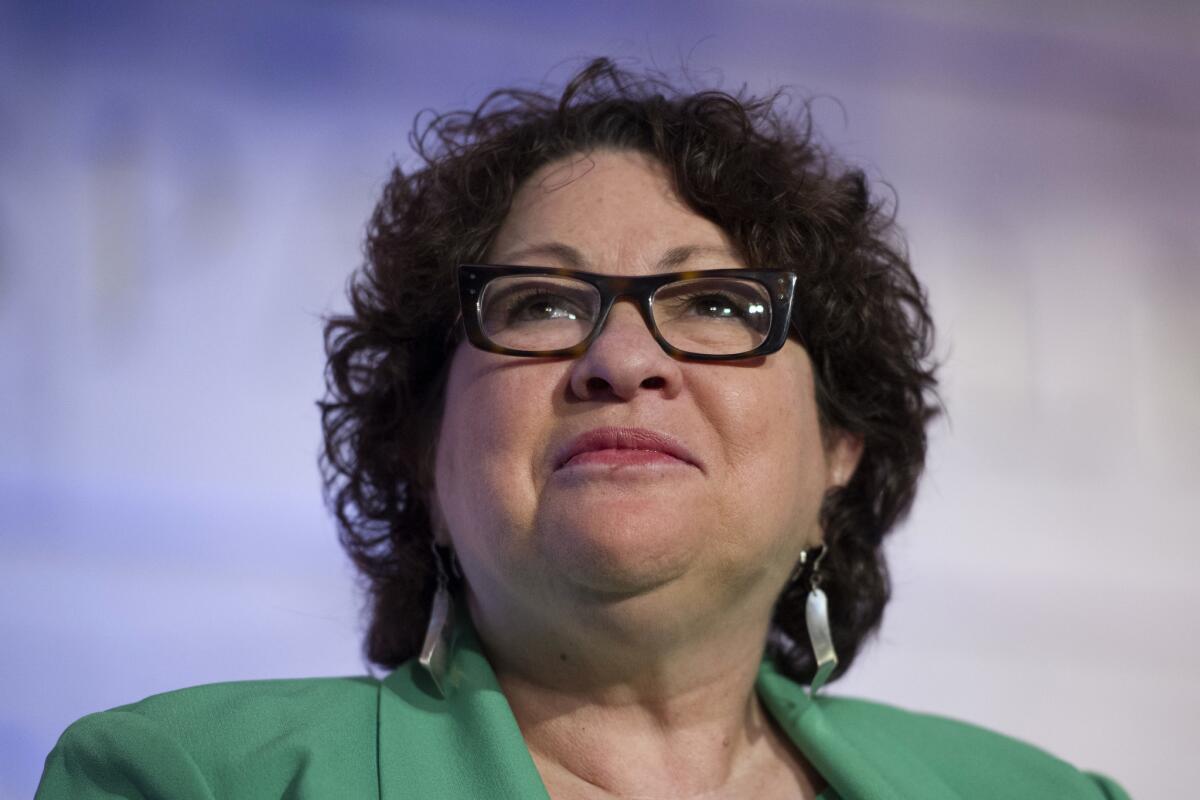Column: My white privilege meets Sonia Sotomayor’s scathing attack on police power

- Share via
In what’s being touted as a turning point in the way the Supreme Court considers the factor of race in the criminal justice system, Justice Sonia Sotomayor on Monday delivered a scathing dissent in Utah vs. Strieff, a 4th Amendment case about police searches.
The court ruled in a 5-3 decision that it was legal for police to search someone even if he or she had been stopped without a lawful reason, as long as an outstanding warrant was later discovered. Unlawful stop or not, if you have so much as an outstanding traffic ticket, any evidence of wrongdoing turned up in a search could count against you.
Sotomayor was in the minority, with Justices Ruth Bader Ginsburg and Elena Kagan, but her dissent effectively sent a stronger message than the ruling itself.
Decrying the way the decision “forgives” police who detain people based on nothing more than a hunch, Sotomayor drew on her own experience as a Latina and invoked the lessons of the Black Lives Matter movement.
“For generations, black and brown parents have given their children ‘the talk,’” she wrote, “— instructing them to never run down the street; always keep your hands where they can be seen; do not even think of talking back to a stranger — all out of fear of how an officer with a gun will react.”
She cited Michelle Alexander’s book, “The New Jim Crow: Mass Incarceration in the Age of Colorblindness,” and Ta-Nehisi Coates’ “Between the World and Me,” which wrestles with the legacies of racism in terms so plain as to be revolutionary.
“People of color,” Sotomayor wrote, “are disproportionate victims” of unlawful police stops “that corrode all our civil liberties and threaten our lives.”
Though it’s hardly news to many blacks and Latinos, plenty of middle-class whites are only now beginning to grasp the scope of their privilege when it comes to dealing with the police. Cavalier as it sounds, I can tell you that as a white person (a blond, female one at that) my interactions with law enforcement over the years have taken a notably breezy tone. I’m hard pressed to think of a situation where being in the presence of a cop would make me fear for my life — even if, ahem, I had actually done something wrong.
I’m hard pressed to think of a situation where being in the presence of a cop would make me fear for my life — even if I had actually done something wrong.
As it happens, on Monday, right around the time Sotomayor’s dissent began making a splash, I did have a run-in with the law. Near where I’m living in New York City, there’s a stretch of road closed to traffic and used as an unofficial dog run. NYPD officers routinely sit in a cruiser nearby, paying no attention to local canines enjoying a few minutes of illicit freedom. However, on Monday my dog and I were stopped by a sanitation officer who’d “observed” my “infraction” and demanded to see ID. Since I didn’t have any on me, he said he would “escort” me to my building to retrieve my driver’s license, and then he made a big show of radioing in to see if I was wanted for anything.
Hoping to defuse the encounter, I registered disbelief: “You’re kidding me!” Then I kicked it up a notch, gently teasing the officer: “How did you get stuck on this detail?” Finally, I resorted to the sympathy card: “My dog and I are here from California and it’s been a hard adjustment.” In the end, I still got a $200 ticket, but the officer apologized because I seemed so nice. And I said I was sorry he had such a difficult job.
Speaking of apologies, I’m also sorry to say that before I read “Between the World And Me,” I probably wouldn’t have thought much about the extraordinary display of privilege contained in this encounter. Like Chief Justice John G. Roberts Jr., who has indicated in the past that he has never been stopped by police, I have generally operated on the notion that if you’re law-abiding, the police are nothing to be afraid of. And I’m an NPR-listening, Obama-loving, supposedly enlightened liberal who’s supposed to think beyond that.
That’s why Sotomayor’s dissent is so important. In pointing out where the court’s decision went wrong, it points the way forward. It suggests that the day might come when the law of the land more accurately echoes the cultural conversation. Either that or the day Roberts gets busted for no good reason. We’ll see which comes first.
Twitter: @meghan_daum
MORE FROM OPINION
California needs to conserve water like the drought is here to stay
Obama won’t admit it, but the fight against Islamist radicalism will last generations
Follow the Opinion section on Twitter @latimesopinionand Facebook
More to Read
A cure for the common opinion
Get thought-provoking perspectives with our weekly newsletter.
You may occasionally receive promotional content from the Los Angeles Times.










